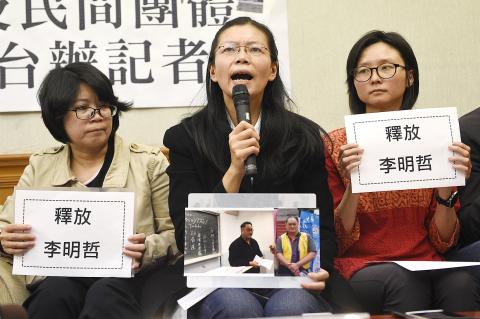Following confirmation yesterday of the detention of Taiwanese human rights advocate Lee Ming-che (李明哲) by Chinese authorities, Lee’s wife and civil rights groups called for his immediate release and condemned Beijing for holding him incommunicado for undisclosed reasons.
China’s Taiwan Affairs Office announced that Lee was being investigated on suspicion of “endangering national security” and was “currently in good physical condition,” which was the first official confirmation of his detention since he arrived in China from Macau on March 19.
Following the announcement, Lee’s wife, Lee Ching-yu (李淨瑜), called on Beijing to immediately release her husband, clarify the charges brought against him and ensure his rights.

Photo: Chen Chih-chu, Taipei Times
Lee Ming-che, a former Democratic Progressive Party (DPP) employee and a long-time advocate of human rights in China, traveled to China to seek medical advice for his mother-in-law and to meet with friends, his wife said.
Lee Ming-che used messaging app WeChat to teach Chinese about public issues and Taiwan-China relations, Lee Ching-yu said, adding that his WeChat account was blocked in summer last year.
He had mailed books that could be considered sensitive by Beijing to friends in China, with one batch — including a book on China’s Cultural Revolution, one on the Sino-Japanese wars and a biography of Mao Zedong (毛澤東) — confiscated by Chinese authorities in August last year, she said.
Over the past several years, Lee Ming-che visited China annually to visit friends he met via WeChat, she said.
“Lee Ming-che has shared Taiwan’s democratic experiences with friends through the Internet. He pays attention to human rights issues and spreads hope to people who need warmth. Those behaviors are not criminal in any civilized country,” Lee Ching-yu said.
“Taiwan has been through the authoritarian White Terror era. We have suffered traumas and pains. The Chinese government should not make Taiwanese relive that history and pain,” she added.
Beijing should have informed Taipei of Lee Ming-che’s detention within 24 hours of his arrest, but it failed to provide such notice until much later and without disclosing his whereabouts or the charges he faces, which are violations of his human rights and related cross-strait agreements, Taiwan Association for Human Rights secretary-general Chiu E-ling (邱伊翎) said.
There has been speculation that Lee Ming-che might have been charged with violating a Chinese law on foreign non-governmental organizations (NGOs), which limits the activities of such groups in China, Democratic Progressive Party Legislator Tsai Yi-yu (蔡易餘) said, adding that would make him the first Taiwanese detained under the law since its passage in April last year.
The law bars NGOs from engaging in human rights issues and judicial reform, Judicial Reform Foundation executive director Kao Jung-chih (高榮志) said, adding that activities considered normal in other nations could constitute crimes in China.
“His detention might be used to warn NGOs,” Kao said, adding that there are concerns that Chinese authorities might torture Lee Ming-che to extract a forced confession.
The human rights advocates called on Beijing to immediately release Lee Ming-che and observe cross-strait agreements that ensure the rights of detainees.

ANOTHER EMERGES: The CWA yesterday said this year’s fourth storm of the typhoon season had formed in the South China Sea, but was not expected to affect Taiwan Tropical Storm Gaemi has intensified slightly as it heads toward Taiwan, where it is expected to affect the country in the coming days, the Central Weather Administration (CWA) said yesterday. As of 8am yesterday, the 120km-radius storm was 800km southeast of Oluanpi (鵝鑾鼻), Taiwan’s southernmost tip, moving at 9kph northwest, the agency said. A sea warning for Gaemi could be issued tonight at the earliest, it said, adding that the storm is projected to be closest to Taiwan on Wednesday or Thursday. Gaemi’s potential effect on Taiwan remains unclear, as that would depend on its direction, radius and intensity, forecasters said. Former Weather Forecast

As COVID-19 cases in Japan have been increasing for 10 consecutive weeks, people should get vaccinated before visiting the nation, the Centers for Disease Control (CDC) said. The centers reported 773 hospitalizations and 124 deaths related to COVID-19 in Taiwan last week. CDC Epidemic Intelligence Center Director Guo Hung-wei (郭宏偉) on Tuesday said the number of weekly COVID-19 cases reported in Japan has been increasing since mid-May and surpassed 55,000 cases from July 8 to July 14. The average number of COVID-19 patients at Japan’s healthcare facilities that week was also 1.39 times that of the week before and KP.3 is the dominant

The Chinese Communist Party’s (CCP) working group for Taiwan-related policies is likely to be upgraded to a committee-level body, a report commissioned by the Mainland Affairs Council (MAC) said. As Chinese President Xi Jinping (習近平) is increasingly likely to upgrade the CCP’s Central Leading Group for Taiwan Affairs, Taiwanese authorities should prepare by researching Xi and the CCP, the report said. At the third plenary session of the 20th Central Committee of the CCP, which ended on Thursday last week, the party set a target of 2029 for the completion of some tasks, meaning that Xi is likely preparing to

US-CHINA TRADE DISPUTE: Despite Beijing’s offer of preferential treatment, the lure of China has dimmed as Taiwanese and international investors move out Japan and the US have become the favored destinations for Taiwanese graduates as China’s attraction has waned over the years, the Ministry of Labor said. According to the ministry’s latest income and employment advisory published this month, 3,215 Taiwanese university graduates from the class of 2020 went to Japan, surpassing for the first time the 2,881 graduates who went to China. A total of 2,300 graduates from the class of 2021 went to the US, compared with the 2,262 who went to China, the document showed. The trend continued for the class of 2023, of whom 1,460 went to Japan, 1,334 went to